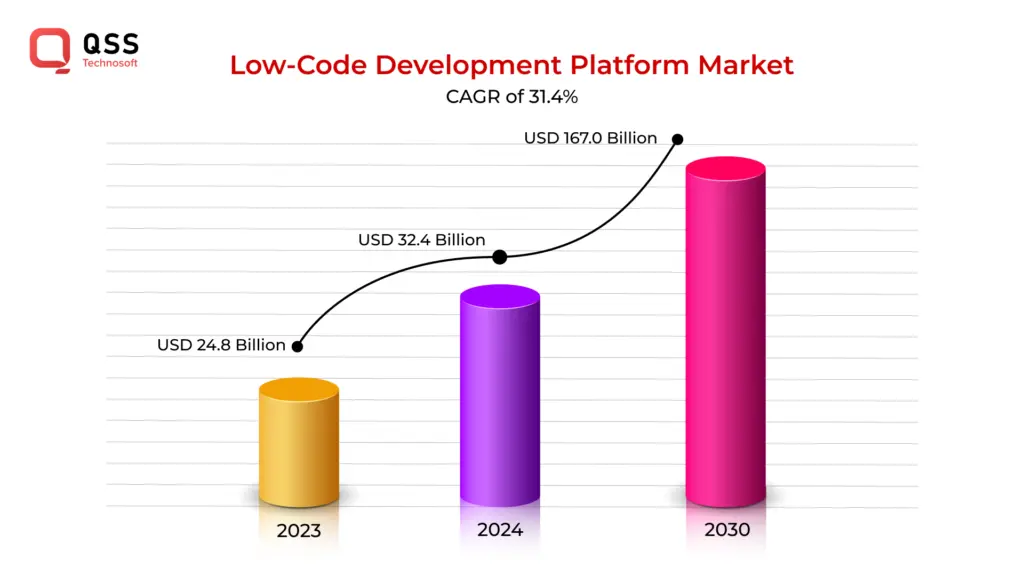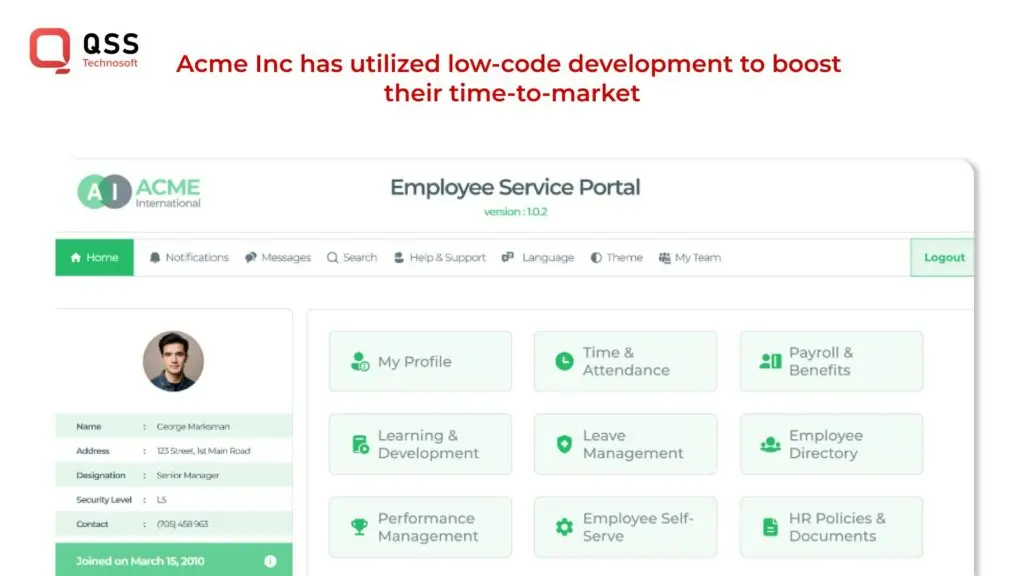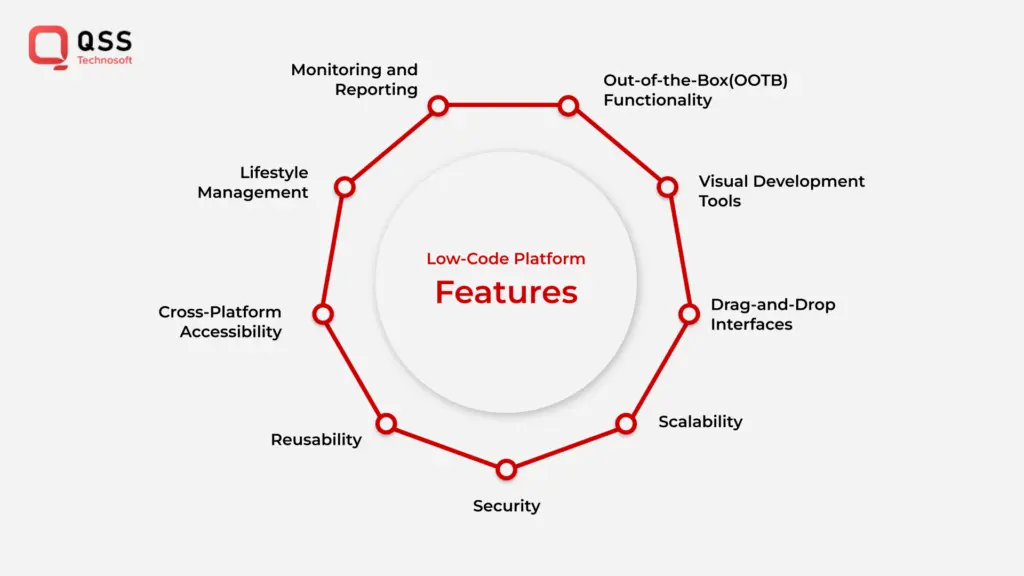The adoption of low-code platforms by businesses today is on a surge, offering a game-changing solution for building innovative enterprise applications.
As per a survey by PS Market Research, the low-code development market is projected to reach $167 billion by 2030, experiencing a compound annual growth rate (CAGR) of 31.4%. This incredible statistic reveals the popularity of low-code platforms in revolutionizing the software development industry.

Let’s learn this with an example- Organizations like Acme Inc has utilized low-code devel
opment to boost their time-to-market. By using visual interfaces and drag-and-drop features, Acme Inc. has reduced their app development cycles by 50%.

Despite the undeniable benefits of low-code platforms, there prevails some common misconceptions and myths. In this blog, we are debunking those common myths about building enterprise-level applications with low-code platforms. Continue reading to know more.
Read also:- What Role Does AI Technology Play in App Development?
Myth 1: Low-Code Platforms Only Works for Simple Applications
Misconception: Belief that low-code platforms are only suitable for simple applications.
Reality: Modern low-code platforms offer robust security, integration capabilities, scalability, and customization options.
Example: Logitech uses low-code platforms to build mission-critical e-commerce applications that handle large volumes of traffic and complex business processes.

Myth 2: Low-Code Platforms Sacrifice Customization for Speed
Misconception: Customization and rapid development cannot coexist in low-code platforms.
Reality: Low-code platforms balance speed and customization with drag-and-drop interfaces, pre-built templates, and reusable components.
Example: Siemens built a highly customized manufacturing execution system (MES) for a factory using a low-code platform, aligning with unique production processes.
Myth 3: Low-Code Platforms Are Generally Not Secure
Misconception: Low-code platforms lack the security of traditional development methods.
Reality: Low-code platforms offer robust security features like data encryption, access control, and compliance certifications.
Example: Liberty Mutual developed and deployed multiple highly secure applications on a low-code platform, handling sensitive customer data.
Read also:- The Top App Development Trends Shaping the Industry in 2024-25
Myth 4: Low-Code Platforms Cannot Handle Business Complexity
Misconception: Belief that low-code platforms cannot handle complex business processes.
Reality: Modern low-code platforms support complex business logic with workflow automation, business rules engines, and APIs for integration.
Example: The University of Pittsburgh Medical Center (UPMC) built a complex claims processing system using a low-code platform, incorporating intricate business rules and workflows.
Myth 5: Low-Code Platforms Doesn’t Support Scalability
Misconception: Low-code platforms are limited in scalability.
Reality: Many low-code platforms support scalability through cloud infrastructure, microservices architecture, and containerization.
Example: Virgin Atlantic built a scalable crew communication application using a low-code platform, supporting thousands of crew members and real-time updates.
Myth 6: Low-Code Platforms Are Not Suitable for Legacy System Integration
Misconception: Low-code platforms cannot effectively integrate with legacy systems.
Reality: Low-code platforms offer integration options like REST APIs, connectors, and middleware tools for seamless legacy system integration.
Example: AT&T used a low-code platform to build an application for managing and monitoring network infrastructure, integrating with existing legacy systems to retrieve data.
Read also:- PHP vs Python: Making the Right Choice for Mobile App Development
Conclusion
So now when you know about the myths and realities of low code development, its high time to consider low-code development for your enterprise-level applications. Low-code platforms can single-handedly build enterprise-level apps, addressing all complex requirement modern organizations possess.
If you’re looking for a partner to guide you through your low-code journey, look no further than QSS Technosoft. Our expertise can help you make the most of low-code development and achieve your business goals. Our expert development team adopts the right approach & best practices to low code platform. We are proud to mention that our work has been recognized by leading B2B reviews and research platforms like GoodFirms, Clutch, MirrorView, and many more.
FAQs
Q: Can low-code platforms handle the complexity and scalability requirements of enterprise apps?
A: Yes, Low code platforms can handle the complexity and scalability requirements of enterprise applications.
Q: Are low-code platforms suitable for industries with strict security and compliance regulations?
A: Low-code platforms come with built-in security features and comply with industry standards. With low code platforms, one can enjoy-access controls, encryption, and seamless integration with enterprise security systems.
Q: Can low-code platforms support the customization and extensibility needed by enterprise businesses?
A: Yes, low-code platforms offer visual development tools, pre-built components, and APIs to enable easy customization without sacrificing scalability or maintainability.
Q: Is it true that low-code platforms lock organizations into a specific vendor or technology stack?
A: Not! Most low-code platforms offer open architecture and support integrations with various technologies. This allows organizations to leverage their existing investments and avoid vendor lock-in.
Q: Can low-code platforms keep up with the evolving technology landscape?
Low-code platforms offer regular updates and new feature releases to ensure compatibility with the latest technologies and industry trends.


Enterprise App Development with Low-Code Platforms: 6 Myths vs. Reality